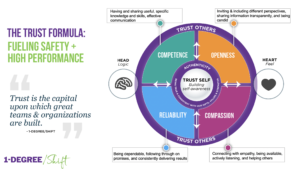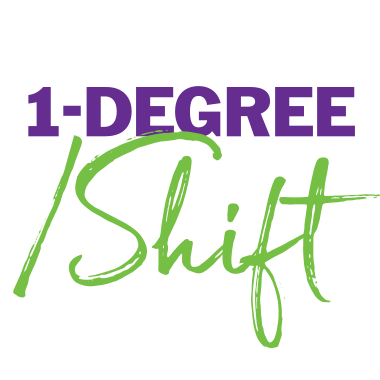Trust is the capital upon which great teams & organizations are built
– 1-DEGREE/Shift
In the realm of modern work, one topic has captured the attention of leaders and organizations worldwide: remote work and hybrid workplaces. The delicate dance between in-person and virtual interactions poses a unique challenge that affects the very core of our transforming workplaces: improving trust at work.
As Lencioni’s 5 Dysfunctions of a Team illuminates, trust enables constructive debate, clarity, commitment, accountability, and ultimately, tangible results. It is within a trusted environment that healthy and positive workplace cultures thrive, fearlessly tackling challenges, embracing possibilities, and shattering barriers.
Yet, in today’s dynamic and fast-paced work landscape, trust has dwindled. The cycle of distrust poses a grave threat, as a staggering 68% of employees and business leaders confess that low trust hampers their daily efforts. However, research reveals a profound truth: companies with high trust levels surpass their peers by a remarkable 400%, unlocking a wealth of benefits including a 50% surge in productivity, a staggering 76% increase in engagement, and an astounding 106% boost in energy at work.
So, as leaders, how can we ignite trust, fostering a remarkable sense of safety and co-creating performance-driven cultures?
At 1-DEGREE/Shift, we believe there are Three Trust Principles:
- Trust is a foundational human need and leadership capability wherever we work/play;
- Trust is dynamic and contextual – we always need to work at cultivating trust;
- High trust levels are one pre-requisite for high engagement and performance.
These Three Trust Principles underline the need for businesses to delve into today’s crisis of trust, recognize its far-reaching implications, and explore pathways to improving trust at work.
The Trust Formula
Our years of experience working with clients to advance humanity through co-creating conscious work cultures, led us to develop the Three Trust Principles and inspired us to create a Trust Formula to help organizations and teams build a strong foundation of trust.
Our Trust Formula consists of five vital ingredients to fuel safety and high performance:
- Competence
- Reliability
- Openness
- Compassion
- Authenticity
 These components work synergistically to fuel safety and high performance, creating an environment where trust can flourish and improving trust at work.
These components work synergistically to fuel safety and high performance, creating an environment where trust can flourish and improving trust at work.
The formula is split into two halves – head space and heart space. The headspace is related to logic, rationality, and facts. Competence and reliability occupy the headspace (left quadrants). The heart space relates to emotions, intuition, and empathy. Openness and compassion occupy the heart space (the right quadrants).
At the centre of this model is authenticity. Building trust with others starts with a deep sense of trust and hence it’s central positioning in our trust formula.
Before we explore how these ingredients work together in this formula, let’s first understand how each ingredient functions individually in relation to trust.
Trust is the glue of life… It’s the foundational principle that holds all relationships
– Stephen Covey
The Ingredients
Competence— having and sharing useful, specific knowledge and skills, effective communication
When colleagues perceive each other as competent, trust blossoms, fostering seamless collaboration and enhanced job satisfaction. However, a lack of competence can chip away at trust, leading to communication breakdowns and strained relationships. Doubts about someone’s abilities breed hesitancy in open communication, perpetuating a detrimental cycle where poor communication further erodes trust.
Reliability— being dependable, following through on promises, and consistently delivering results
When an employee is perceived as reliable, it signifies they have a steadfast commitment to fulfilling job responsibilities at the highest standard. This reliability nurtures confidence and trust, as individuals know they can depend on this employee to deliver on promises and meet deadlines without fail. Employees who prioritize reliability in their work are more likely to be trusted and respected by their colleagues and leaders, increasing opportunities for collaboration and enhancing productivity.
Openness— inviting and including different perspectives, sharing information transparently, and being candid
Incorporating diverse perspectives enriches decision-making processes, infusing them with fresh insights and perspectives. When employees perceive their colleagues and leaders as open and transparent, trust flourishes, forging robust team relationships and inspiring innovation. Transparent sharing of information nurtures effective communication and seamless collaboration, fostering a culture of trust and unity. However, concealing or siloing information, and dismissing different viewpoints, can weaken trust, sowing seeds of suspicion and tension among employees.
Compassion— connecting with empathy, being available, actively listening, and helping others
When leaders exercise compassion, they extend understanding towards their colleagues’ experiences, challenges, and emotions, creating an environment of value and support. Compassion has the remarkable ability to cultivate trust, elevate well-being, and enhance psychological safety within the workplace. However, it is often missed or misunderstood, mistaken for pity or overshadowed by self-interest, inadvertently depleting trust. Yet, the power of compassion can be cultivated and strengthened through intentional exercises, enabling individuals to become catalysts for workplace trust and improving trust at work.
Authenticity— being true and consistent with our gifts, values, and strengths
Authenticity paves the way for openness, transparency, and the freedom to express thoughts, opinions, and emotions without fear of judgment. As you embrace your authenticity, trust in yourself grows, radiating through reliable choices, vulnerability, positive beliefs, and healthy boundaries. This self-trust becomes the foundation for trust in others, creating a harmonious and dynamic workplace where individuals can fully contribute, collaborate, and innovate.
Self-trust is the first secret of success
– Ralph Waldo Emerson
Conclusion
These five ingredients – competence, reliability, openness, compassion and authenticity work harmoniously, fueling safety, high performance, and a thriving workplace culture. While focusing on one or a few elements may yield improvements in those areas, true trust flourishes when all five are integrated. To cultivate a culture of trust, continuous attention and practice are essential for each component.
Our Trust Formula can help you rebuild trust, foster collaboration, and unlock the full potential of your teams. Trust is the driving force that propels individuals to thrive, enabling them to contribute their unique talents and abilities to the collective success of the organization. Let’s collaborate in shaping productive workplaces that nurture trust and empower individual growth!


